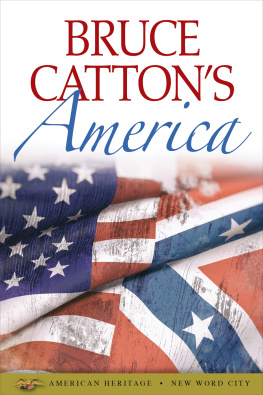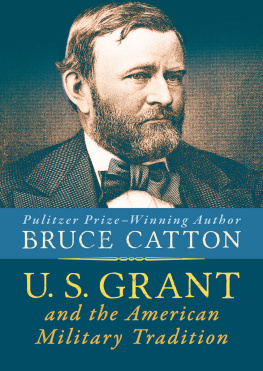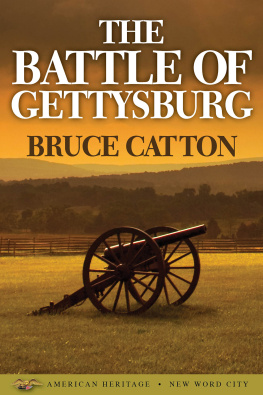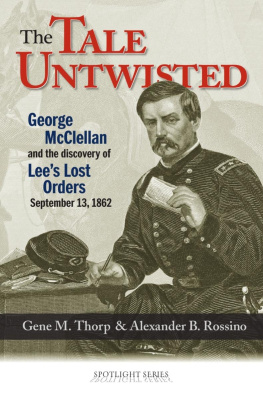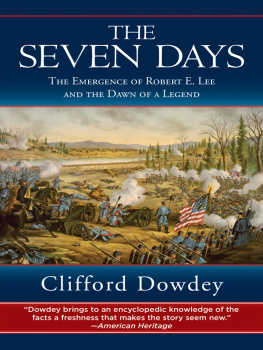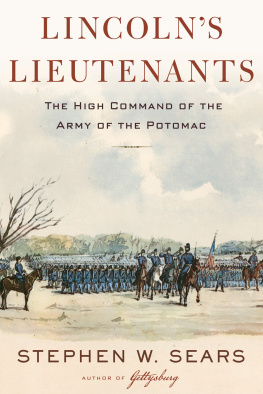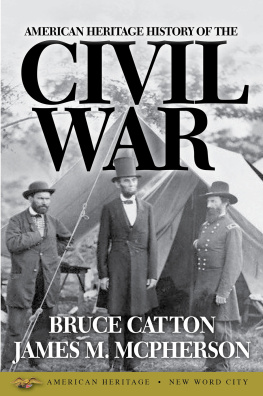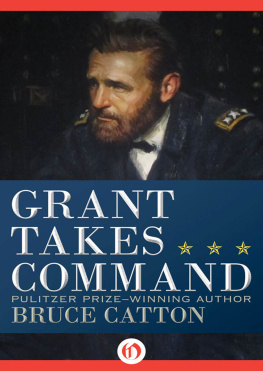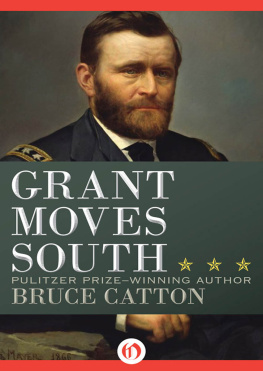Preface
The books which make up this trilogy began, very simply, as an attempt to understand the men who fought in the Army of the Potomac. As a small boy I had known a number of these men in their old age; they were grave, dignified, and thoughtful, with long white beards and a general air of being pillars of the community. They lived in rural Michigan in the pre-automobile age, and for the most part they had never been fifty miles away from the farm or the dusty village streets; yet once, ages ago, they had been everywhere and had seen everything, and nothing that happened to them thereafter meant anything much. All that was real had taken place when they were young; everything after that had simply been a process of waiting for death, which did not frighten them muchthey had seen it inflicted in the worst possible way on boys who had not bargained for it, and they had enough of the old-fashioned religion to believe without any question that when they passed over they would simply be rejoining men and ways of living which they had known long ago.
This was too much for an adolescent to understand. Perhaps it is too much for anybody to understand, in a skeptical age. But there it was: these old gentlemen, drowsing out the greater part of their lives in the backwoods, had once been lifted beyond themselves by an experience which perhaps was all the more significant because it was imperfectly understood. They gave a tone and a color to the lives of the people who knew them, and they put a special meaning on such a word as patriotism; it was not something you talked about very much, just a living force that you instinctively responded to. I can remember one old man who had lost his left arm in the Wilderness, and he used to go about town in the summer peddling cherries and blackberries in a bucketthere was just enough of his left forearm so that he could hook it over the bail of the bucket and carry it convenientlyand it never once entered my childish head to feel sorry for him because he had been a cripple for half a century. On the contrary, I thought he was rather lucky. He carried with him forever the visible sign that he had fought for his country and had been wounded in its service. Probably only a very backward boy could have thought anything of the kind.
Still, that was what it was like. A generation grew up in the shadow of a war which, because of its distance, somehow had lost all resemblance to everyday reality. To a generation which knew the war only by hearsay, it seemed that these aged veterans had been privileged to know the greatest experience a man could have. We saw the Civil War, in other words, through the distorting haze of endless Decoration Day reminiscences; to us it was a romantic business because all we ever got a look at was the legend built up through fifty years of peace.
We do learn as we grow older, and eventually I realized that this picture was somewhat out of focus. War, obviously, is the least romantic of all of mans activities, and it contains elements which the veterans do not describe to children. This aged berry-peddler, for instance, who lost his arm in the Wilderness: he had never told me about the wounded men who were burned to death in the forest fire which swept that infernal stretch of woodland while the battle was going on; nor had any of his comrades who survived that fight and went on through the whole campaign to the last days at Petersburg ever mentioned the lives that were wasted by official blunders, the dirt and the war-weariness and the soul-numbing disillusionment that came when it seemed that what they were doing was going for nothing. There was a deacon in the church, who used to remind us proudly that he had served in the 2nd Ohio Cavalry. Not until years later did I learn that this regiment had gone with Sheridan in the Shenandoah Valley, burning barns, killing livestock and pillaging with a free hand so that the Southern Confederacy, if it refused to die in any other way, might die of plain starvation. In a sense, the research that went into these books was simply an effort to find out about the things which the veterans never discussed.
Yet, in an odd way, the old veterans did leave one correct impression: the notion that as young men they had been caught up by something ever so much larger than themselves and that the war in which they fought did settle something for usor, incredibly, started something which we ourselves have got to finish. It was not only the biggest experience in their own lives; it was in a way the biggest experience in our life as a nation, and it deserves all of the study it is getting.
In any case, these books try to examine a small part of that experience in terms of the men who did the fighting. Those men are all gone now and they have left forever unsaid the things they might have told us, and no one now can speak for them. Here is my attempt to speak about them.
1962 B. C.
ONE
Picture-Book War
1. There Was Talk of Treason
The rowboat slid out on the Potomac in the hazy light of a hot August morning, dropped down past the line of black ships near the Alexandria wharves, and bumped to a stop with its nose against the wooden side of a transport. Colonel Herman Haupt, superintendent of military railroads, a sheaf of telegrams crumpled in one hand, went up the Jacobs ladder to the deckclumsily, as was to be expected of a landsman, but rapidly, for he was an active manand disappeared into a cabin. A moment later he returned, and as he came down the ladder he was followed by a short, broad-shouldered, sandy-haired man, deeply tanned by the sun of the Virginia peninsula, with thin faint lines of worry between his eyes: Major General George Brinton McClellan, commander of the Army of the Potomac, which had been coming up from the south by water for a week and more and which at the moment was scattered all the way from Alexandria to the upper Rappahannock, most of it well out of the generals reach and all of it, as he suspected, soon to be out from under his authority.
There was an air about this youthful generalan air of far-off bugles, and flags floating high, and troops cheering madly, as if the picture of him which one hundred thousand soldiers had created had somehow become real and was now an inseparable part of his actual appearance. He could look jaunty and dapper after a day in the saddle, on muddy roads, in a driving rainstorm; like a successful politician, he lived his part, keeping himself close to the surface so that every cry and every gesture of the men who adored him called him out to a quick response that was none the less genuine for being completely automatic. It was impossible to see him, in his uniform with the stars on his shoulders, without also seeing the armymy army, he called it proudly, almost as if it were a personal possession, which was in a way the case: he had made it, he had given it shape and color and spirit, and in his mind and in the minds of the men he commanded the identification was complete.


